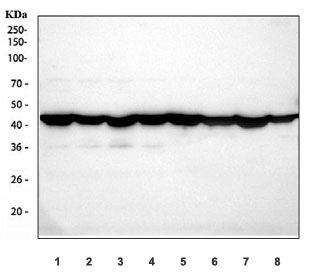- Tel: 858.663.9055
 Email: info@nsjbio.com
Email: info@nsjbio.com
- Tel: 858.663.9055
- Email: info@nsjbio.com
Beta Actin Antibody reagents target β-actin, a highly conserved cytoskeletal protein encoded by the ACTB gene. As one of the most abundant proteins in eukaryotic cells, beta actin plays critical roles in maintaining cell shape, motility, intracellular trafficking, and signal transduction. Its localization to the cytoplasm and plasma membrane highlights its function in cellular structure and dynamic remodeling processes.
Beta actin is expressed across nearly all tissue types, making it a universal housekeeping protein. For this reason, the ACTB Antibody and its variants are widely used as loading controls in western blotting and quantitative assays, providing normalization against which experimental changes can be compared. Beyond its role as a control, beta actin is also a subject of research in cancer, neurobiology, developmental biology, and infectious disease.
NSJ Bioreagents provides Beta Actin Antibodies validated for western blotting, immunohistochemistry, immunofluorescence, ELISA, and flow cytometry. Each Beta Actin Antibody undergoes strict validation to ensure specificity, reproducibility, and compatibility with diverse research workflows.
By choosing Beta Actin Antibodies from NSJ Bioreagents, researchers gain reagents optimized for reliability and clarity. Our antibodies deliver strong detection of actin bands in western blotting, reproducible staining in tissues, and robust performance across applications. Detailed datasheets, recommended controls, and optimized protocols further ensure reproducibility in both laboratory and translational settings.
The Beta Actin Antibody supports a broad spectrum of applications across cell biology, pathology, and translational medicine.
Beta Actin Antibodies are widely used as housekeeping protein controls.
The Beta Actin Antibody provides normalization for protein expression studies.
ACTB Antibody reagents ensure reliable comparison across samples.
Beta Actin Antibodies highlight cytoskeletal architecture and remodeling.
The Beta Actin Antibody supports studies of cell adhesion, migration, and polarity.
ACTB Antibody reagents clarify actin’s role in intracellular trafficking.
Beta Actin Antibodies detect altered cytoskeletal organization in tumors.
The Beta Actin Antibody supports research into metastasis and invasion.
ACTB Antibody reagents provide biomarkers for cancer cell motility.
Beta Actin Antibodies clarify actin’s role in dendritic spine formation.
The Beta Actin Antibody supports studies of synaptic plasticity and axon guidance.
ACTB Antibody reagents validate developmental changes in cytoskeletal proteins.
Beta Actin Antibodies detect cytoskeletal rearrangements during infection.
The Beta Actin Antibody supports research into viral and bacterial pathogenesis.
ACTB Antibody reagents highlight host–pathogen interactions.
Beta Actin Antibodies are integrated into biomarker-driven diagnostic workflows.
The Beta Actin Antibody provides reproducibility in quantitative protein analysis.
ACTB Antibody reagents ensure reliability in translational pipelines.
As a highly conserved cytoskeletal protein, β-actin is indispensable for both structural support and dynamic cell regulation. The Beta Actin Antibody equips researchers to study cell architecture, signaling, and pathology, while the ACTB Antibody expands applications into diagnostics and translational research.
In basic cell biology, Beta Actin Antibodies clarify cytoskeletal function and remodeling. In oncology, the Beta Actin Antibody reveals changes in actin organization during tumor progression. In neuroscience, ACTB Antibody reagents highlight actin’s role in synaptic connectivity and plasticity.
Clinically, β-actin serves as both a biomarker and a universal control protein, ensuring reproducibility across experimental systems. Reliable Beta Actin Antibodies remain foundational in bridging basic science with translational applications.
Beta actin is one of the most studied and widely used proteins in biology, serving as both a housekeeping control and a subject of research in cytoskeletal dynamics, cancer, neuroscience, and infection. The Beta Actin Antibody provides validated reagents for studying actin function, expression, and localization, while the ACTB Antibody supports applications in diagnostics and translational medicine. By ensuring specificity, reproducibility, and assay versatility, these antibodies remain indispensable for advancing biomedical research and improving clinical outcomes.

Western blot testing of 1) human HeLa, 2) human K562, 3) human MCF7, 4) human Jukrat, 5) rat brain, 6) rat kidney, 7) mouse brain and 8) mouse kidney tissue lysate with Beta Actin antibody (cat # R30971). Predicted molecular weight ~48 kDa.

